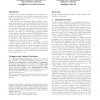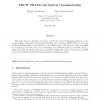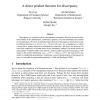511 search results - page 67 / 103 » Lower bounds for distributed markov chain problems |
NIPS
2004
13 years 9 months ago
2004
Most existing tracking algorithms construct a representation of a target object prior to the tracking task starts, and utilize invariant features to handle appearance variation of...
INFOCOM
2010
IEEE
13 years 6 months ago
2010
IEEE
—In wireless networks, how to select transmit power that maximizes throughput is a challenging problem. On one hand, transmissions at a high power level could increase interferen...
STOC
2001
ACM
14 years 8 months ago
2001
ACM
Optimal program slicing determines for a statement S in a program whether or not S affects a specified set of statements, given that all conditionals in are interpreted as non-d...
TCS
1998
13 years 7 months ago
1998
This paper presents algorithms and lower bounds for several fundamental problems on the Exclusive Read, Concurrent Write Parallel Random Access Machine (ERCW PRAM) and some result...
COCO
2008
Springer
13 years 9 months ago
2008
Springer
Discrepancy is a versatile bound in communication complexity which can be used to show lower bounds in the distributional, randomized, quantum, and even unbounded error models of ...



